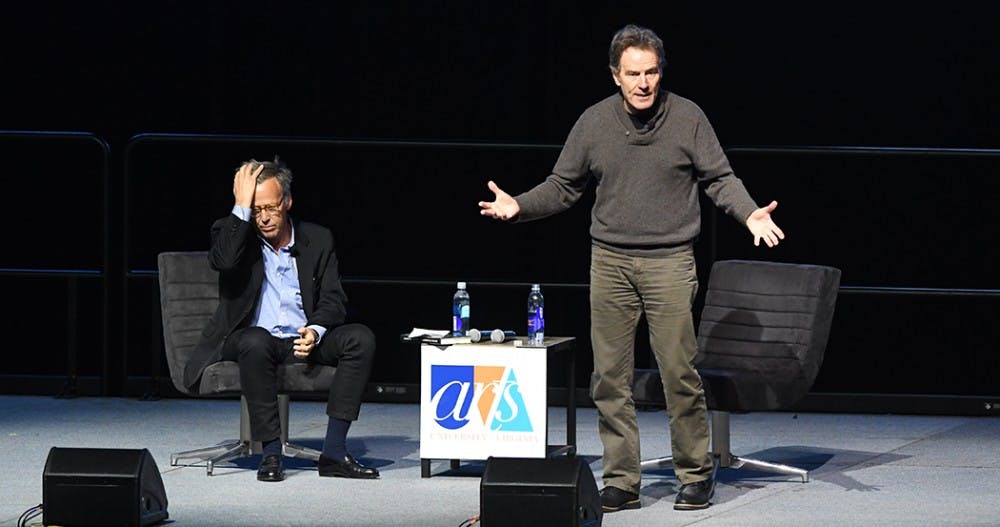As a grand finale for the Festival of the Book, celebrated actor, director, producer and author Bryan Cranston visited the University over the weekend. Though his connection to literature is tenuous at best — he is undoubtedly better known for his work with television — he was nonetheless an impressive figure to give the Festival’s final presentations.
Cranston gave a limited access talk to select Drama students and professors at the Helms Theatre Saturday and an open event at John Paul Jones Arena entitled “A Conversation with Bryan Cranston” Sunday.
The two events understandably varied, most notably in crowd size — in his talk Saturday, the attendees numbered less than 100, compared to the thousands who listened to him speak the next afternoon.
Despite this, many common themes flowed through both presentations. For one, Cranston seemed totally at ease in both settings, treating both the small audience and the large one as though they were good friends. Though this is probably a testament to his prolific acting abilities, it was unusual to see such a well-known figure speak so casually.
Saturday’s talk took a more personal route, with questions prepared by Drama students and moderated by Colleen Kelly, Assoc. Prof. and Chair for the Department of Drama. Cranston was more than happy to give advice to the aspiring actors and directors in attendance.
In describing his methods for taking on various identities, Cranston said to “embrace a character and allow him to come inside.” He went on to add that plot was more important to him than anything.
“It’s always about the story first,” Cranston said. “It’s got to mean something to me.”
One of the most popular topics for both days was Cranston’s starring role as Walter White on acclaimed show “Breaking Bad,” specifically on the show’s stellar writing. When asked by Kelly how he projected the “duality of Walter White’s character,” he responded, “Here’s the secret to really good acting — find really good writing. Next?”
Cranston went on to describe how quickly he was hooked by the premise of “Breaking Bad” — “When I read the script … It was brilliant.” Multiple times, he mentioned creator and writer Vince Gilligan by name as the true reason for the show’s success.
“The heavy lifting comes from Vince Gilligan,” Cranston said. “I just show up and embrace it.”
Cranston also stressed the importance of hard work.
“There’s no excuse,” he said Saturday. “If you’re an actor, you’d better be acting. If you’re a writer, you’d better be writing.”
This theme carried over to Sunday’s talk as well, as he repeatedly attributed his success to his work ethic. In the latter conversation, which was moderated by television producer and University alumnus Mark Johnson, Cranston discussed the effect that a difficult childhood had on his desire to succeed.
“There was an inherent work ethic taught to me,” he said. “I knew I could outwork anyone.”
Just as important as hard work, according to Cranston, is a healthy dose of luck.
“No successful career has happened without luck,” he said Saturday.
In his talk at Helms Theatre, Cranston admitted that his role in “Breaking Bad” was only made possible through a series of coincidences. An unexpected scheduling error allowed Cranston to audition for an episode of “The X-Files” — an episode which Gilligan just so happened to be directing.
“It was chance,” Cranston said. “Someone else would be sitting in this chair right now if I hadn’t taken the role.”
This point segued into the need for struggling actors to take any role available to them.
“I can guarantee that you’re going to accept work you’re not particularly fond of,” Cranston told the audience of Drama students Saturday. His described it as a means to an end and inevitably looped back to his oft-repeated “hard work” mantra.
In both talks, the final topic was a very relevant one — the preservation of arts in an uncertain political climate.
“I think there’s a sensibility that the arts are an afterthought … but it’s so much more than that,” he said Saturday, adding that “you can have a lifelong love affair if you go into it for the right reasons.”
He also made the claim that “we … as a society will die off without the arts,” adding Sunday that “a society that doesn’t embrace and nurture the arts … is not enlightened.” This was his closing message both days, and Sunday he made a general appeal to the crowd.
“Embrace yourself in the arts,” Cranston said. “Please do support the arts.”
His conclusion Saturday was more personal, tailored to aspiring actors and directors.
“It’s [going to] be tough, and not everyone is gonna make it through. But if you love what you’re doing, that’s gonna make it easier,” he said.
Cranston walked offstage Saturday waving and repeating, “Good luck! Have fun.” In his wake, he left a bounty of good advice and hope for anyone with a vested interest in the arts.





